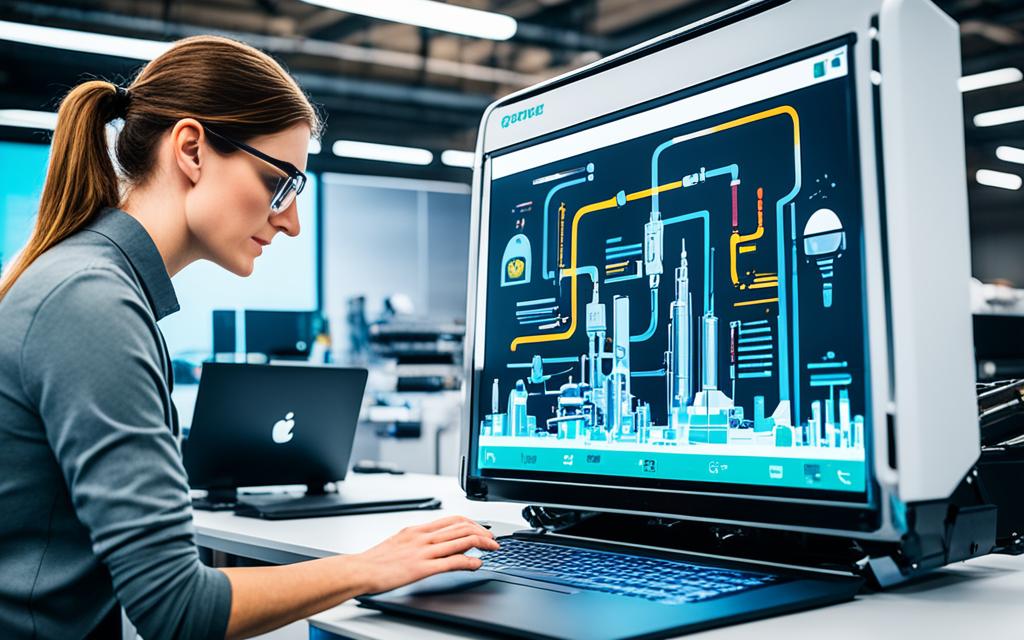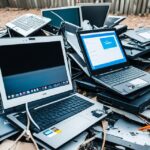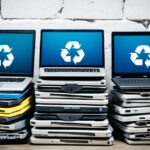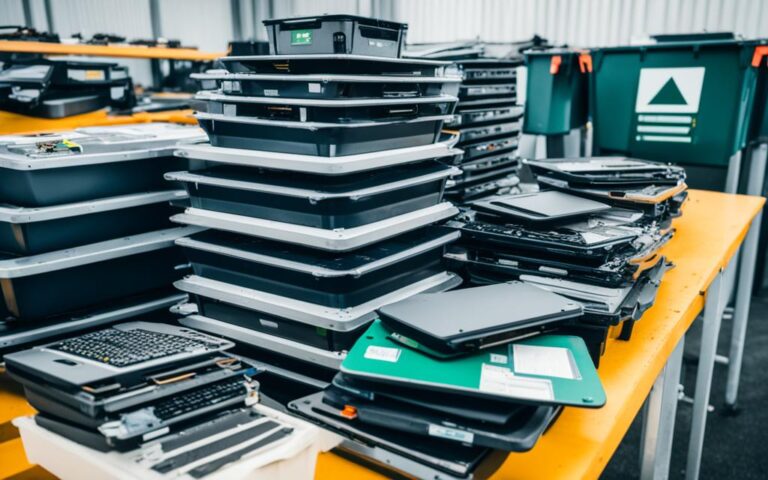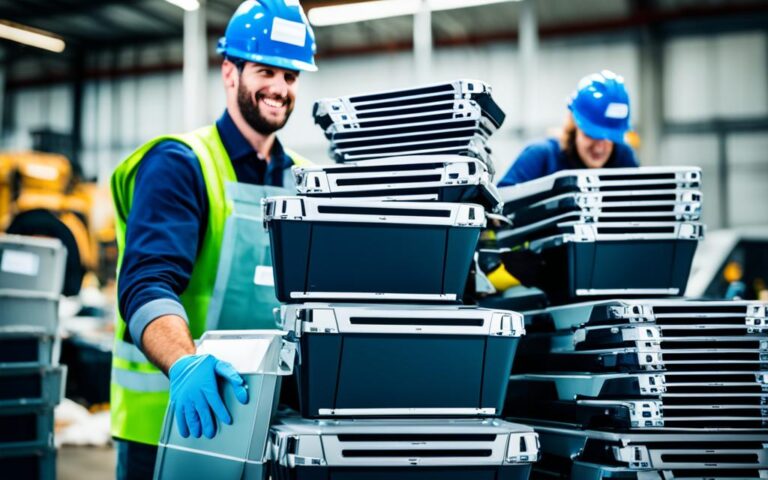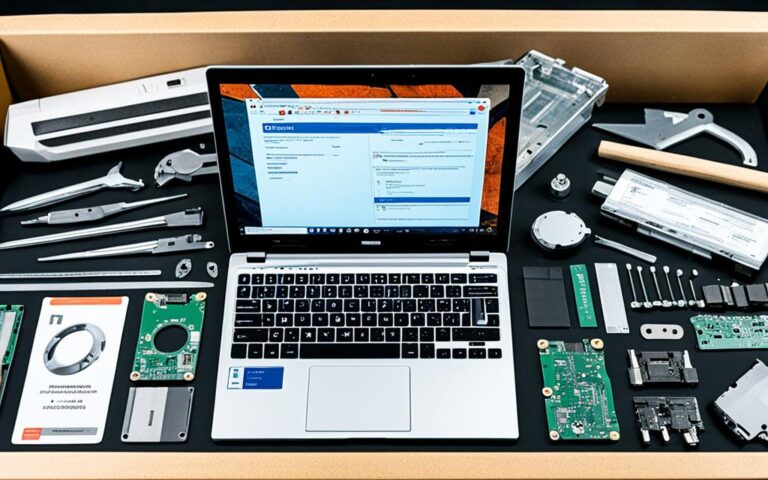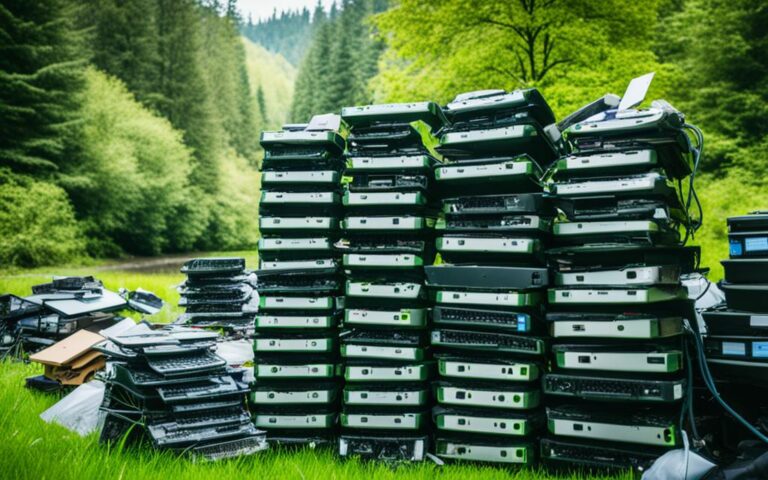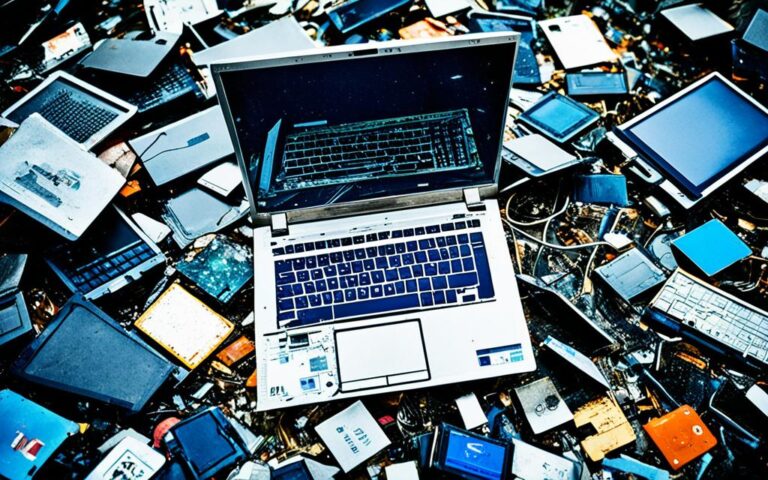The Future of Laptop Recycling: Predictions and Trends
In an age where technology is evolving rapidly, the need for effective and sustainable laptop recycling methods is becoming more important than ever. This article explores the predictions and trends that will shape the future of laptop recycling in the UK. It discusses the role of emerging technologies, such as AI, blockchain, and IoT, in improving recycling processes. It also highlights the impact of consumer behavior and awareness, as well as regulatory changes and policies, on laptop recycling. The challenges and opportunities in the field, including data security concerns, resource scarcity, and economic viability, are also addressed. Additionally, actionable steps for individuals, businesses, governments, and educational institutions to promote sustainable laptop recycling are provided.
As we delve into the future of laptop recycling in the UK, it is essential to understand the trends and predictions that will shape this rapidly evolving industry. From advancements in technology to changes in consumer behavior and regulatory landscapes, various factors will influence how laptops are recycled and repurposed.
The Role of Emerging Technologies
In an ever-evolving world, emerging technologies are set to revolutionize the landscape of laptop recycling. With the rise of AI, blockchain, and IoT, the possibilities for sustainable IT recycling have expanded exponentially.
AI: Automating Recycling Processes
Artificial Intelligence (AI) holds immense potential in automating the sorting of e-waste. By utilizing machine learning algorithms, AI can identify materials that are suitable for reuse or recycling. This not only streamlines the recycling process but also ensures that valuable resources are extracted efficiently. Additionally, AI enables precise identification of hazardous materials, leading to safer disposal methods.
Blockchain: Tracking the Lifecycle of Electronic Components
Blockchain technology offers a secure and transparent way to track the entire lifecycle of electronic components. By utilizing blockchain, manufacturers, recyclers, and consumers can verify the authenticity and origin of components, ensuring responsible and ethical recycling practices. The decentralized nature of blockchain provides an immutable record, eliminating the possibility of fraudulent activities and promoting accountability.
IoT: Extending Device Lifespan
The Internet of Things (IoT) can be leveraged to monitor and manage the condition of devices in real-time. By collecting data on device usage, performance, and maintenance needs, IoT enables proactive measures to extend the lifespan of laptops. This reduces the frequency of device replacements, minimizing e-waste generation. IoT also facilitates efficient resource allocation by sending alerts when a device requires repairs or upgrades.
These emerging technologies not only make the recycling process more efficient but also add a layer of transparency and accountability. With AI improving sorting accuracy, blockchain ensuring responsible recycling practices, and IoT extending device lifespan, the future of laptop recycling looks promising.
| Emerging Technology | Benefits |
|---|---|
| AI |
|
| Blockchain |
|
| IoT |
|
Consumer Behavior and Awareness
Consumer behavior and awareness play a crucial role in the effectiveness of laptop recycling programs. As awareness about the environmental impact of e-waste grows, consumers are becoming more responsible. They are more inclined to recycle their old devices and consider the sustainability credentials of brands when making new purchases. This shift in consumer behavior is expected to drive demand for more sustainable electronics and influence manufacturers to adopt greener practices.
The increasing awareness of the environmental consequences of improper laptop disposal has led to a change in consumer attitudes. People are now more conscious of the impact their electronic devices have on the environment and are actively seeking ways to reduce their ecological footprint.
One key factor driving this change is the rising concern about the hazardous materials present in laptops and other electronics. Consumers now understand that these devices contain toxic substances like lead, mercury, and cadmium that can contaminate the environment if not properly recycled. Consequently, they are more motivated than ever to recycle their old laptops to prevent such harmful substances from entering landfills.
Another driver of consumer behavior change is the growing demand for sustainability in products. Individuals are increasingly considering the sustainability credentials of brands when making purchasing decisions. They want to support companies that are committed to reducing their environmental impact and prioritizing responsible manufacturing and recycling practices.
Educational campaigns and government initiatives that raise awareness about the benefits of laptop recycling have also had a significant impact on consumer behavior. Individuals are now more knowledgeable about the advantages of recycling their laptops, such as conserving valuable resources and reducing greenhouse gas emissions.
“Recycling our laptops is not only a responsible action but also a step towards a more sustainable future.”
The growing consumer demand for sustainable electronics is expected to have a profound effect on manufacturers. Companies are now recognizing the need to prioritize eco-friendly practices throughout the entire lifecycle of their products, including the recycling stage. They are investing in research and development to create more sustainable materials, design for recyclability, and improve their recycling processes.
Overall, consumer behavior and awareness are key drivers for the future of laptop recycling. As more individuals become educated about the environmental impact of e-waste and prioritize sustainable choices, the demand for responsible recycling practices will continue to rise, pushing manufacturers and policymakers to implement greener solutions.
Regulatory Changes and Policies
Regulatory changes and policies are significant factors shaping the future of laptop recycling. Governments worldwide are implementing stricter regulations to ensure responsible e-waste management. These regulations often include guidelines for data destruction, material recovery, and disposal methods. Non-compliance can result in hefty fines, making it crucial for companies to adopt sustainable practices. These regulations serve as a catalyst for change, pushing the industry towards a more responsible and sustainable future.
The growing concern about the environmental impact of electronic waste has prompted governments to take action. With the increasing number of discarded laptops and other electronic devices, it has become imperative to enforce regulations that govern their proper disposition. These regulations aim to minimize the harmful effects of e-waste on the environment and human health.
“Effective regulation is essential to ensure that laptop recycling is carried out responsibly. By implementing guidelines for data destruction, material recovery, and disposal methods, governments can hold businesses accountable for their e-waste management practices.”
Guidelines for data destruction ensure that personal and sensitive information is securely erased from recycled laptops. This prevents potential data breaches and protects individuals from identity theft. Material recovery guidelines promote the extraction of valuable resources from discarded laptops, reducing the need for mining raw materials. Proper disposal methods, such as safe handling of hazardous components, help protect the environment by preventing pollution and contamination.
Non-compliance with these regulations can lead to severe consequences for businesses. Hefty fines and penalties are imposed on organizations that fail to meet the required standards. This serves as a strong incentive for companies to adopt sustainable practices and prioritize responsible e-waste management.
Role of International Collaboration
The issue of laptop recycling extends beyond national borders. It requires international collaboration and cooperation to address the global impact of e-waste. Governments, industry leaders, and environmental organizations work together to develop and enforce regulations that promote sustainable practices in laptop recycling.
International agreements and frameworks, such as the Basel Convention, provide a platform for countries to exchange knowledge, best practices, and resources related to e-waste management. These collaborations enable the sharing of expertise and facilitate the development of comprehensive regulations that can be implemented globally.
The collective efforts of governments, businesses, and individuals are essential in shaping the future of laptop recycling. By adhering to regulatory changes and policies, we can create a more sustainable and responsible approach to e-waste management.
Challenges and Opportunities in Laptop Recycling
The future of laptop recycling presents both challenges and opportunities. As technology continues to advance, the need for sustainable and effective recycling methods becomes increasingly important. In this section, we will explore the key challenges faced in laptop recycling and the opportunities that arise from addressing these challenges.
Data Security Concerns
One of the major challenges in laptop recycling is ensuring data security. Before recycling, it is essential to securely delete all data from devices to protect sensitive information. This poses a significant challenge as data recovery techniques are constantly evolving. Implementing robust data destruction methods is crucial to mitigate the risk of data breaches and identity theft.
Resource Scarcity
Laptops and other electronic devices contain valuable materials, including rare earth elements. The scarcity of these resources poses a challenge to sustainable laptop recycling. However, it also presents an opportunity to develop innovative recycling processes that efficiently recover and reuse these materials. By implementing effective resource recovery methods, we can reduce the dependence on mining and contribute to a more sustainable circular economy.
Economic Viability
The economic viability of laptop recycling programs has been a subject of debate. However, advancements in technology are making the recycling process more cost-effective. Through advancements in automation, high-tech sorting techniques, and efficient processing methods, the economic feasibility of recycling old laptops is improving. This offers an opportunity to establish profitable recycling businesses and create new jobs in the sector.
Public Awareness and Education
Public awareness and education play a crucial role in driving consumer behavior towards sustainable laptop recycling practices. Many individuals are unaware of the environmental impact of e-waste and the benefits of recycling their laptops. By conducting public awareness campaigns, educational programs, and providing accessible recycling facilities, we can encourage and empower individuals to make responsible recycling choices.
Challenges and Opportunities
| Challenges | Opportunities |
|---|---|
| Data security concerns | Developing secure data destruction methods |
| Resource scarcity | Innovative resource recovery processes |
| Economic viability | Advancements in recycling technology |
| Public awareness and education | Driving sustainable consumer behavior |
Conclusion
As we look ahead, the future of laptop recycling is shaped by emerging technologies, consumer behavior and awareness, regulatory changes and policies, and various challenges and opportunities. It is crucial for individuals, businesses, governments, and educational institutions to take actionable steps towards promoting sustainable laptop recycling. By educating ourselves, disposing of devices responsibly, purchasing eco-friendly products, adopting sustainable practices, and implementing stricter regulations, we can create a greener and more responsible future for laptop recycling.
Emerging technologies, including AI, blockchain, and IoT, offer promising solutions to automate recycling processes, improve transparency, and extend the lifespan of devices. Consumer awareness about e-waste’s environmental impact is driving demand for sustainable electronics and influencing manufacturers to adopt greener practices. Meanwhile, regulatory changes and policies are enforcing responsible e-waste management and pushing the industry towards more sustainable practices, while also posing challenges such as data security concerns and resource scarcity.
To overcome these challenges and seize the opportunities in laptop recycling, collaboration is key. Individuals can play their part by responsibly disposing of devices through certified recycling programs. Businesses can ensure proper data destruction and implement circular economy principles. Governments can enact stricter regulations and provide incentives for sustainable practices. Educational institutions can raise awareness and educate the future generation about the importance of responsible e-waste management.
By taking these collective actions, we can pave the way for a future where laptop recycling is not only environmentally friendly but also economically viable. Together, we can build a sustainable and responsible ecosystem for laptop recycling that benefits both present and future generations.
FAQ
How is AI revolutionizing laptop recycling?
AI enables automation in the sorting of e-waste and identification of reusable or recyclable materials, making the recycling process more efficient and effective.
What role does blockchain technology play in laptop recycling?
Blockchain provides a secure and transparent way to track the lifecycle of electronic components, ensuring accountability and facilitating responsible e-waste management.
How can IoT contribute to sustainable laptop recycling?
IoT can be leveraged to monitor the condition of devices in real-time, extending their lifespan and reducing e-waste, leading to more sustainable laptop recycling practices.
How does consumer behavior impact laptop recycling?
Increasing consumer awareness of the environmental impact of e-waste is driving the demand for sustainable electronics and encouraging responsible disposal and recycling of old devices.
What are the regulatory changes and policies shaping laptop recycling?
Governments worldwide are implementing stricter regulations, which include guidelines for data destruction, material recovery, and disposal methods, to ensure responsible e-waste management.
What are the challenges in laptop recycling?
Data security concerns, resource scarcity, and the economic viability of recycling programs are major challenges that need to be addressed for a more sustainable laptop recycling industry.
What opportunities are there in laptop recycling?
Advancements in technology are making the recycling process more cost-effective, while public awareness and education campaigns can drive consumer behavior towards more sustainable practices.

